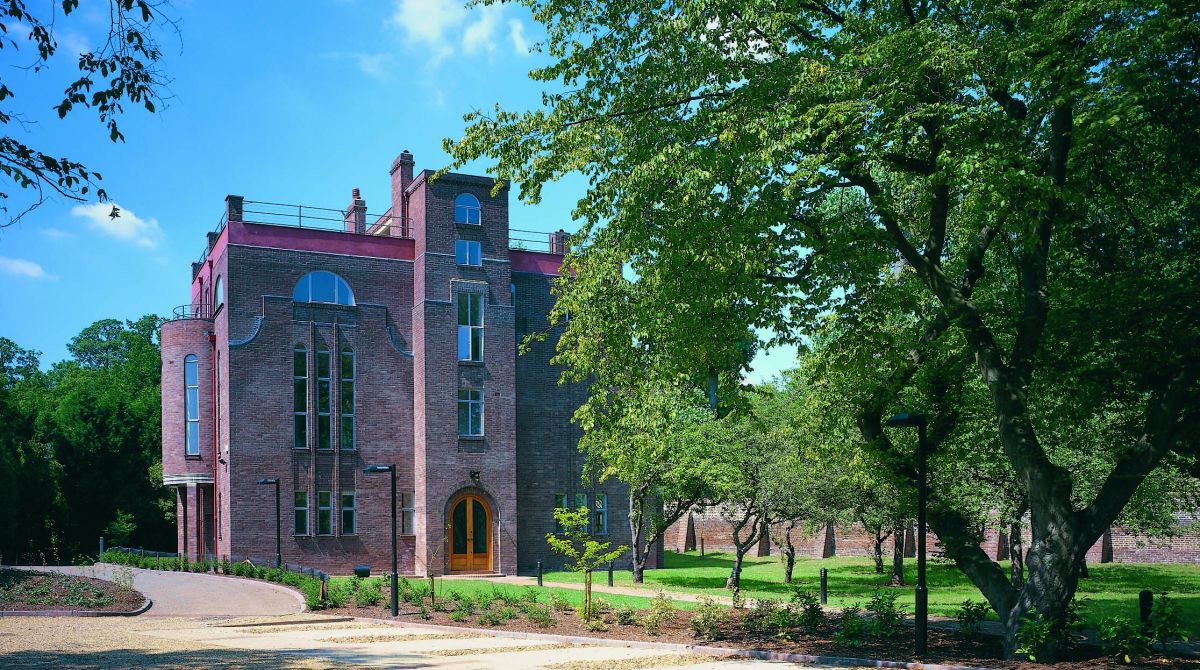Kingston University's Dorich House Museum secures National Lottery support for heritage project exploring its recent history
Posted Wednesday 29 May 2019

Dorich House Museum has been awarded a grant from the National Lottery to fund a new heritage project examining a lost period in the iconic building's history. The Squatter Years: Recovering Dorich House Museum's Recent Past will collate recollections from the community that lived in and visited the building during the 1980s and 90s.
The £65,000 National Lottery grant will provide vital funds to enable museum staff and volunteers to explore the transition of Dorich House from a private home to a public museum.
Acquired by the University in 1994 and located close to Kingston Hill campus, Dorich House is the 1930s former studio house of the renowned sculptor, artist and designer Dora Gordine and her husband Richard Hare, a scholar of Russian art and literature. The museum holds the largest collection of Gordine's paintings, drawings and sculpture in the world, as well as an important collection of Russian art and design.
 The National Lottery Heritage Fund aims to create positive and lasting change for people and communities, now and in the future.The Squatter Years project will examine the history of Dorich House in the 1980s and 90s, a period in which important decisions were made about its future - including the sale of much of Gordine and Hare's collection of Russian art and design to support its renovation. Although some aspects of that history are well documented, others, such as the involvement of local people who campaigned to have Dorich House listed, a major art theft, and the artists, squatters and party-goers who occupied the house after Gordine's death have long been subjects of local interest, myth and rumour.
The National Lottery Heritage Fund aims to create positive and lasting change for people and communities, now and in the future.The Squatter Years project will examine the history of Dorich House in the 1980s and 90s, a period in which important decisions were made about its future - including the sale of much of Gordine and Hare's collection of Russian art and design to support its renovation. Although some aspects of that history are well documented, others, such as the involvement of local people who campaigned to have Dorich House listed, a major art theft, and the artists, squatters and party-goers who occupied the house after Gordine's death have long been subjects of local interest, myth and rumour.
Dorich House Museum is home to the largest collection of Dora Gordine's work in the world. Dr Fiona Fisher, curator of the museum and a researcher in design history at Kingston School of Art will lead the project working in collaboration with participation curator Natalie Kay, artist Laura Grace Ford, and film-maker Annaleena Piel Linnå. "The funding will support volunteers from Kingston University, Grey Court School, and the wider community to work together to collect interviews and produce exhibitions, publications and new creative works," she explained. "We are grateful our project has been made possible through money raised by National Lottery players. Working with our partners and volunteers, we are excited to invite the public to share their memories of Dorich House to help us bring its recent history alive for future visitors."
 Picture: Dorich House Museum, Kingston University/Ellie Laycock.The National Lottery Heritage Fund uses money raised by the National Lottery to inspire, lead and resource the UK's heritage to create positive and lasting change for people and communities, now and in the future.
Picture: Dorich House Museum, Kingston University/Ellie Laycock.The National Lottery Heritage Fund uses money raised by the National Lottery to inspire, lead and resource the UK's heritage to create positive and lasting change for people and communities, now and in the future.
Following Gordine's death in 1991, the grade II listed building was renovated by Kingston University and opened as a museum in 1996. Regarded as one of London's hidden gems and a major cultural attraction within the Royal Borough of Kingston Upon Thames, Dorich House Museum is internationally significant as one of only a handful of public museums created by a female artist as a space to live and work.
Alongside partner venue the Stanley Picker Gallery, Kingston University's gallery of contemporary art and design, Dorich House Museum works with young people from across the University to support teaching, learning and research and offer high quality volunteering and professional development opportunities. Participation programmes provide creative opportunities for local schools, charities and organisations and for students from other colleges and universities.
- Find out more about Dorich House Museum.
- Find out more about research at Kingston University.
Contact us
General enquiries:
Journalists only:
- Communications team
Tel: +44 (0)20 8417 3034
Email us



